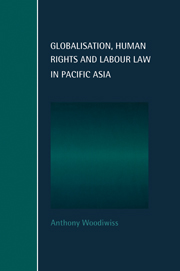Book contents
- Frontmatter
- Contents
- List of figures
- Acknowledgements
- CONVENTIONS
- Introduction: the ‘clash of civilisations’ and the problem of human rights
- PART ONE Against absolutism and relativism: towards a globally enforceable concept of human rights
- 1 Transnational sociality, sociological theory and human rights
- 2 The challenge of Pacific capitalism: from Pax Americana to the Japanese Way?
- PART TWO Human rights, labour law and patriarchalism in Pacific Asia
- Conclusion
- Notes
- References
- Index
2 - The challenge of Pacific capitalism: from Pax Americana to the Japanese Way?
Published online by Cambridge University Press: 07 May 2010
- Frontmatter
- Contents
- List of figures
- Acknowledgements
- CONVENTIONS
- Introduction: the ‘clash of civilisations’ and the problem of human rights
- PART ONE Against absolutism and relativism: towards a globally enforceable concept of human rights
- 1 Transnational sociality, sociological theory and human rights
- 2 The challenge of Pacific capitalism: from Pax Americana to the Japanese Way?
- PART TWO Human rights, labour law and patriarchalism in Pacific Asia
- Conclusion
- Notes
- References
- Index
Summary
To attempt an exhaustive account of the transnational structures and flows pertinent to employment relations in Pacific Asia would be a mam-moth task that is not only unnecessary but would also seriously slow the pace of and unbalance the narrative that I wish to present. Instead, I will provide a highly condensed but analytically pointed synoptic reading of some of the principal texts in the field before focusing on the structures and flows most pertinent to labour law. This said, each of the case studies will provide a specification of the more general flows pertinent to employment relations, labour law and human rights in the country concerned.
In his landmark study Rethinking the Pacific (1990), Gerry Segal presents a powerful argument against the view that it is or soon will be possible to speak of a Pacific social entity or ‘community’ in the sense that it is possible to speak of the communities of Western European or North Atlantic states (see also, Dirlik, 1993). He suggests instead that we learn to ‘think Pacific’ through combining an appreciation of the region's diversity with an acknowledgement of the increasingly global nature of the forces that are shaping it. Whilst I have no particular problem with this conclusion as such, it seems to me that the denial of the existence of a trans-Pacific social entity that it incorporates is more a function of the way in which Segal makes his argument than it is a conclusion that necessarily follows from the data he provides.
- Type
- Chapter
- Information
- Publisher: Cambridge University PressPrint publication year: 1998



